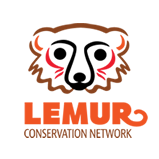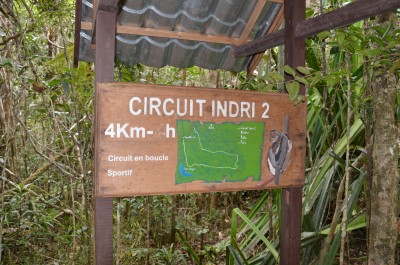
In Madagascar, ecotourism can be a win-win-win for tourists, Malagasy people, and Madagascar’s lemurs and other wildlife. Ecotourism can help protect natural environments by supporting conservation and providing financial benefits to local communities. Madagascar is one of the world’s financially poorest countries. So, by improving the country’s economy, ecotourism can help Malagasy people thrive in coexistence with nature.
“Lemurs are the goose laying the golden eggs for Madagascar,” says Jonah Ratsimbazafy, Secretary General of GERP Madagascar. “Thousands of families depend on lemurs, because tourists will not come to see empty forests.”
How does ecotourism benefit Madagascar’s people and wildlife?
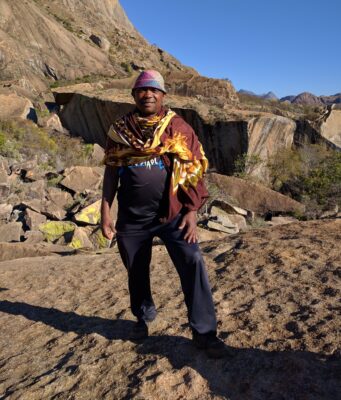
Ecotourism can create financial incentives at the national, regional, and local levels for the protection of lemurs and other wildlife.
Improves Madagascar’s Economy
Tourism is one of Madagascar’s main industries. The economic gains from ecotourism give Madagascar’s government an incentive to protect natural areas and ensure that lemurs and their habitats exist for generations to come.
Provides Good Jobs for Malagasy People
Locally, tourism provides jobs for tour guides and tour company administrators and hotel and restaurant owners and staff. Additionally, communities living near parks and reserves earn money from shops, crafts, and other goods that support the tourism industry. While jobs in tourism are often seasonal, many Malagasy workers in tourism make enough money in the busy season to support themselves and their families for the entire year.
Park Guides are Protectors of the Forest
When earning money in tourism, communities near the parks are often less reliant on natural resources. Many park guides view themselves as protectors of the forest. In Ranomafana National Park, for example, several of the park guides grew up hunting birds and other animals in the forest by necessity. But now, they use this experience and knowledge to share their love for Malagasy wildlife. Their skills in identifying plants and animals help them share the forest’s riches with visitors from around the world.
Additionally, several community-run reserves — like Anja Reserve in the south and Antanatiembo Reserve in the north — have been created by Malagasy people to both protect the wildlife in their area and ensure their communities benefit from ecotourism in the area.
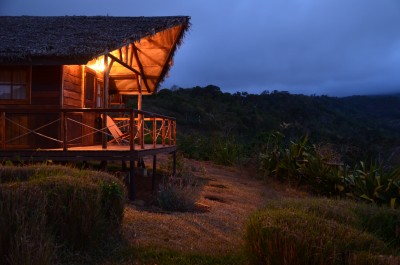
What is sustainable tourism in Madagascar?
Are there green certifications?
Worldwide, ecotourism is often focused on green-certified eco-lodges or eco-resorts, which have met a certain level of environmental and social responsibility in order to meet sustainable tourism certification by organizations like WorldWide Ecolodges. In Madagascar, there is no green certification for hotels or resorts.
It is up to travelers and travel agencies to ensure that lodging and activities are as sustainable as possible and that they ethically support local communities and wildlife conservation.
Tips for a Responsible Ecotourist Trip to Madagascar
Choose hotels and lodges without pet lemurs.
Lemurs are sometimes taken from the wild to attract tourists at hotels and lodges. The populations of many lemur species is dangerously low, and this can deplete the number of animals remaining in the forest.
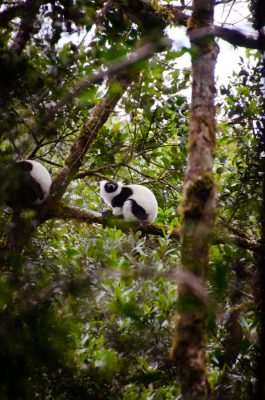
Don’t take or share lemur selfies.
It is illegal to have lemurs as pets in Madagascar. When Malagasy people see photos online of foreigners close to lemurs, they feel it is unfair. Some are then more motivated to have lemurs as pets.
Take photos of lemurs by themselves or take a selfie with a lemur that is at least 7 meters (or 23 feet) away from you.
If you’re booking your own hotels, ensure they offer accommodation for your Malagasy driver.
Many hotels have free accommodation for Malagasy guides and drivers who have brought tourists to stay. So, when choosing a hotel or lodge, inquire if they have a place for your driver or guide to stay as well. If they don’t, be sure to tip your driver well because he or she likely had to pay for their own lodging elsewhere.
Be gracious and respectful.
Malagasy people are generally very welcoming to tourists, proud of their heritage, and love sharing their country and all of its riches with visitors. Be kind and respectful to each person you meet, and you will feel very welcome!
Give back when you can.
If you want to support Madagascar and Malagasy people before, during, or after your stay, find a conservation organization to support through our website, or in the Bradt Madagascar guidebook.
